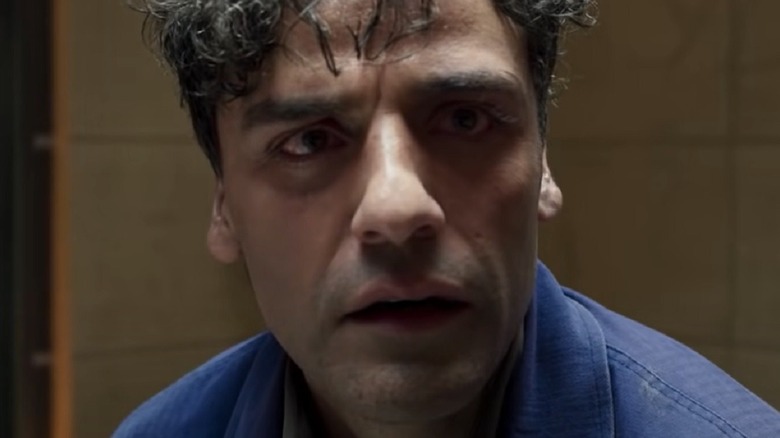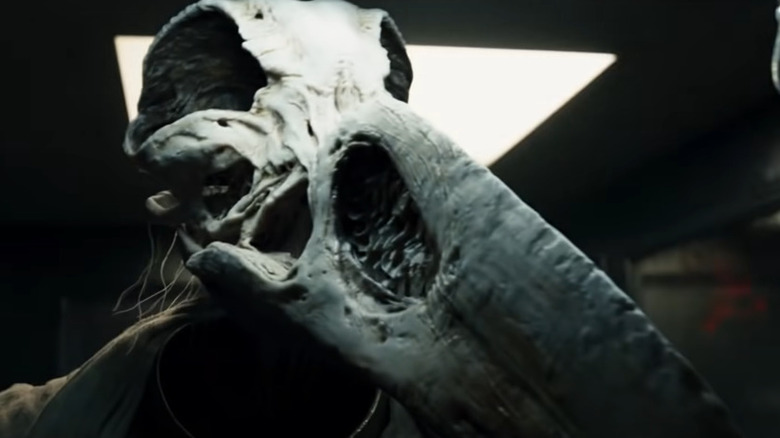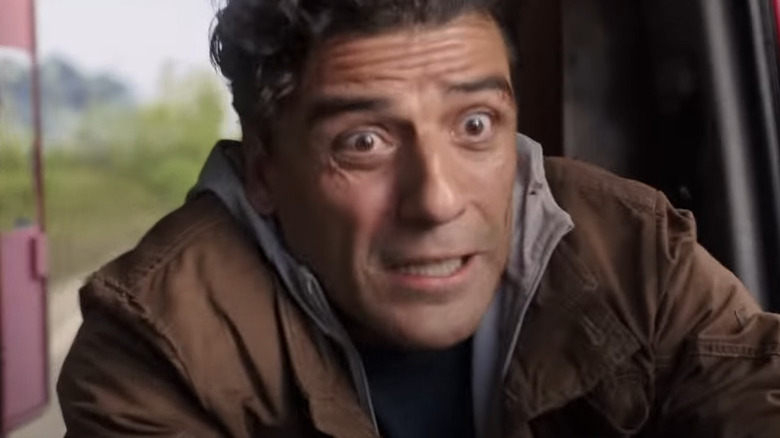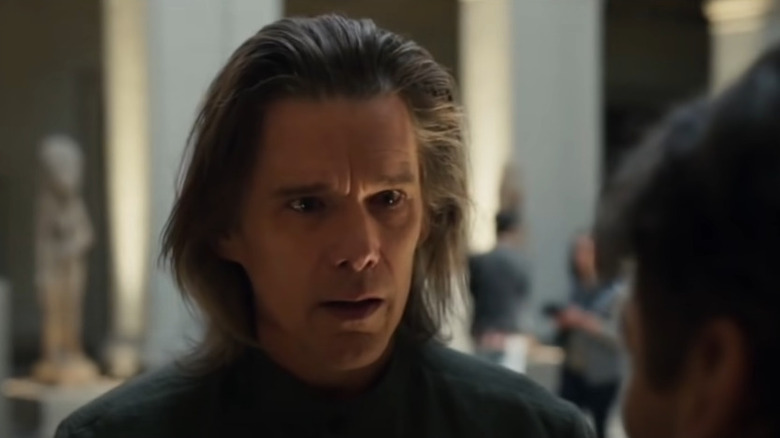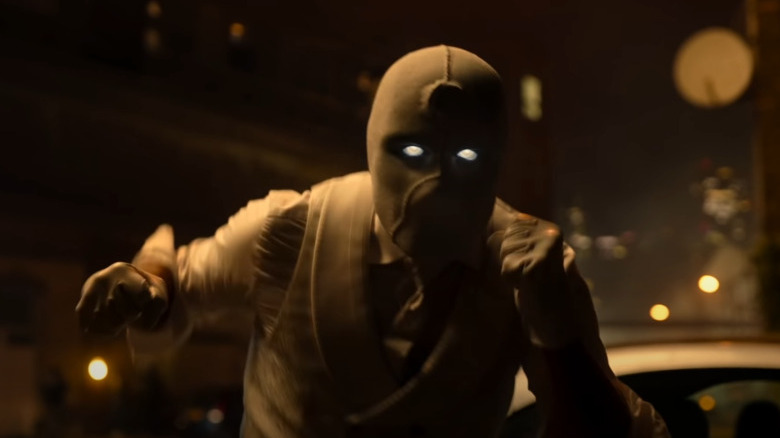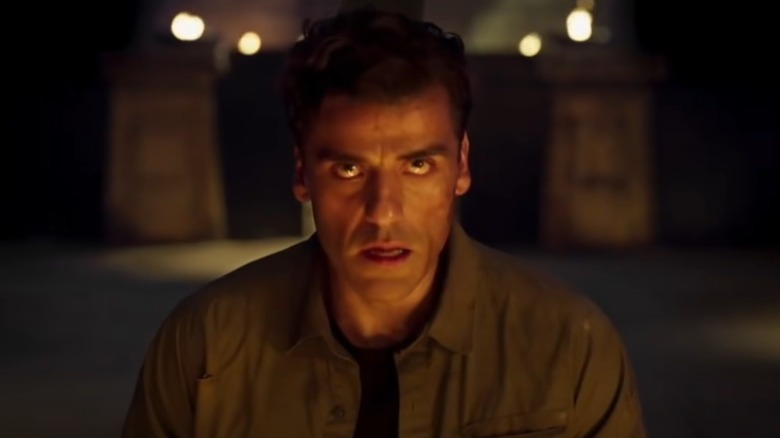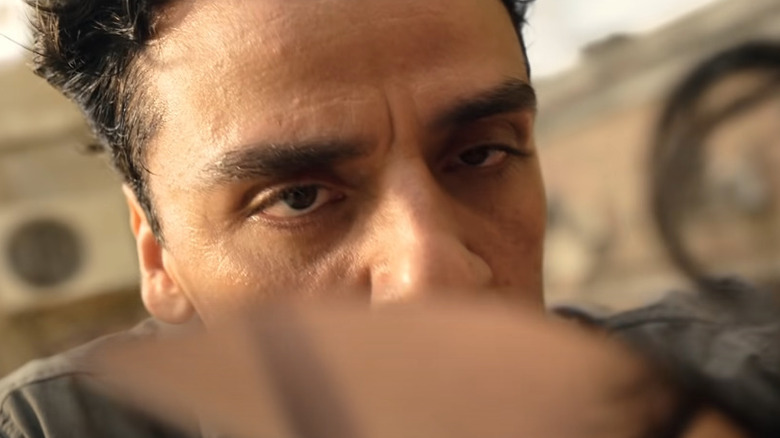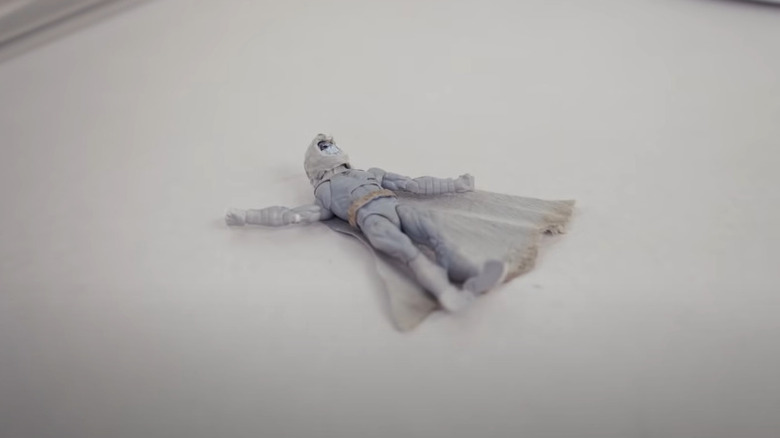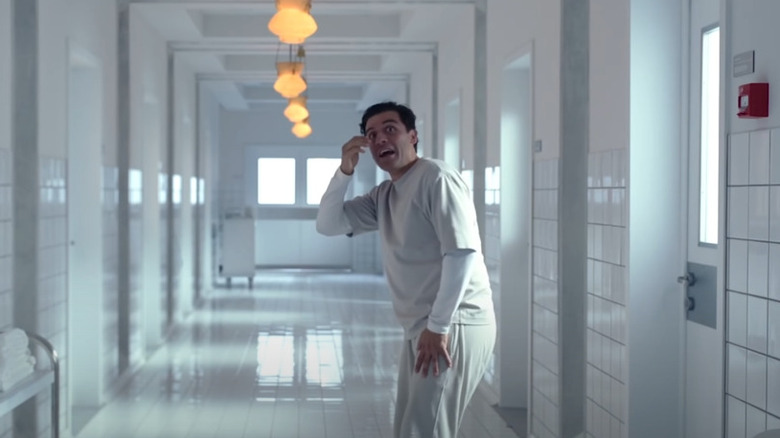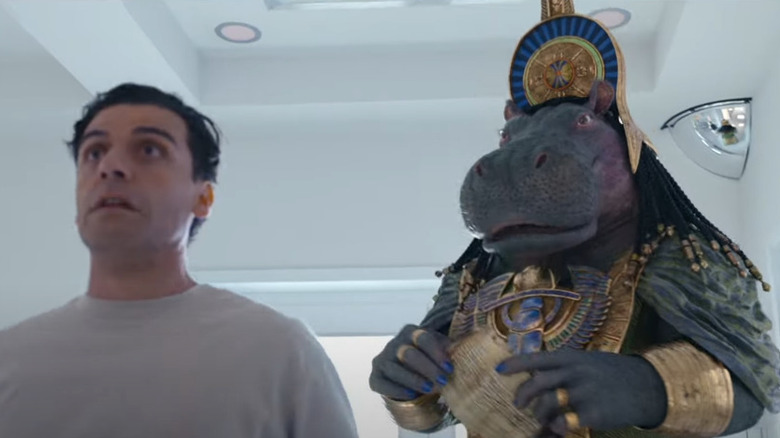Things Only Adults Notice In Moon Knight
Unlike fellow Disney+ releases "WandaVision," "The Falcon and the Winter Soldier," "Loki," and "Hawkeye," Marvel's "Moon Knight" is a show about an unknown entity, a character previously unseen in the MCU. That didn't stop it from scoring high with the critics, however. The six-part miniseries is "wonderfully unpredictable every step of the way," said TVLine, while TechRadar called it "Marvel's most mature offering yet" due to its unprecedented levels of violence (for a Marvel show) and psychological horror themes.
While "Moon Knight" does embrace some pretty dark subject matter, it's not totally inaccessible for younger Marvel fans — it's rated TV-14 and 16+ in the United States and the United Kingdom, respectively. Still, there are certain lines, references, and details that will likely go way over the heads of most teenage viewers. "Moon Knight" was clearly made with a slightly older, more mature demographic in mind, and we're about to prove it.
Here are some of the many things that only adults notice in "Moon Knight." Spoilers ahead.
F. Murray Abraham voices Khonshu
One of the many highlights of "Moon Knight" is the relationship between the eponymous character (portrayed by Oscar Isaac) and Khonshu, the ancient Egyptian god he serves. An otherworldly presence dressed in bone white with a gigantic bird's skull for a head, the MCU version of Khonshu has no qualms about giving hilariously brutal orders to whoever happens to be the dominant personality in his earthly avatar's mind. A booming voice combined with a penchant for pettiness makes Khonshu a threatening yet delightful presence in the series. But why does he sound so familiar? That's because the powerful god is voiced by none other than F. Murray Abraham.
Adult moviegoers will know Abraham from the likes of "Scarface," "Star Trek: Insurrection," "The Name of the Rose," and "Amadeus," for which he scooped the best actor award at the Oscars. Abraham also co-starred in Wes Anderson's best picture nominee "The Grand Budapest Hotel," portraying the older version of the film's protagonist. He pops up in kids' movies from time to time, but, given the themes of the films Abraham typically appears in, this is the sort of thing that older viewers are far more likely to notice.
The song playing in the cupcake van
In the first episode of "Moon Knight," we see Oscar Isaac's Steven Grant trying to make sense of his condition — he suspects that he's sleepwalking, yet he doesn't appear to be leaving his bed. He shackles himself to his bedframe and takes every possible precaution, yet he still wakes up with unexplainable injuries. Steven soon discovers that he has been leading a dual existence. He tries to keep himself awake using puzzles and study books, but he nods off — only to wake up in Austria, where armed men are trying to kill him.
Steven tries to escape his unknown pursuers by hijacking a cupcake van. During the chase, he loses control of his body on more than one occasion. Every time he returns, more of his assailants are dead and he's holding the gun that presumably killed them. After one blackout, he opens his eyes to find himself driving the van backward down a mountainside road. It's a thrilling sequence, made all the more memorable by the song choice.
As older viewers will no doubt have noticed, the Wham! hit "Wake Me Up Before You Go-Go" is playing as the chase unfolds. While the choice of background music contrasts perfectly with Steven's dire situation to create an air of absurd hilarity, it's also a fun reference to how the gift shop worker typically wakes up with zero awareness of what has just happened.
Harrow's hypocrisy
Steven Grant meets Khonshu's former avatar and current Ammit worshipper Arthur Harrow (Ethan Hawke) during the first episode of "Moon Knight." He's in Austria when Steven unexpectedly wakes up there with what appears to be a broken jaw and a golden scarab in his possession. Harrow seeks to resurrect Ammit — an Egyptian goddess who prefers preemptive judgment over due process — by using the scarab to find her tomb.
Harrow proceeds to harass and hassle Steven for the scarab, even managing to track him down to the National Art Gallery in London (although this wasn't exactly hard, given that Steven revealed his place of work as he pleaded with the cult leader). Here, Harrow initiates a conversation with Steven about the merits of Ammit's brand of justice and why she needs to make a comeback. He even presents this argument to Steven: "Would you wait to weed a garden until after the roses were dead?"
The series antagonist doesn't seem to realize the inherent hypocrisy in his words — and perhaps, only older viewers would care enough to give this some thought. As Harrow demonstrates on numerous occasions, he is not above lying, stealing, or even murdering people to get what he wants. And while one can make the argument that he sees all of these things as necessary to bring back Ammit, the harm he causes to others should be more than enough for his goddess to terminate him.
Float like a butterfly, sting like a bee
When the mild-mannered, non-confrontational Steven Grant gets a taste of what seems to be a typical night in Marc Spector's life, he tries to summon Khonshu's protective armor, the Moon Knight suit. He needs it to save himself and Marc's wife Layla El-Faouly (May Calamawy) from a gigantic, invisible, jackal-like creature summoned by Harrow. His attempt at playing the hero goes hilariously wrong (or perhaps right) when he finds himself wearing a dapper all-white suit instead, one that fans will recognize as the get-up worn by Moon Knight's Mr. Knight personality in the comics.
Despite having no combat experience, Steven insists on handling the jackal himself. To divert the monster's attention away from Layla, he dares it to lunge at him, taunting the creature with the line: "Float like a butterfly, sting like a bee, my name's Steven with a V!" As anyone old enough to remember the great Muhammad Ali knows, "Float like a butterfly, sting like a bee" is the boxing legend's most iconic quote. He came out with it before he took on world champion Sonny Liston for the first time. Ali (then known as Cassius Clay) shocked the world when he dethroned Liston, but — despite landing one sweet punch — Steven wasn't quite as successful in his bout.
Was there romance between Khonshu and Hathor?
After failing to retrieve the scarab from Harrow, Khonshu takes matters into his own hands. He causes a visible disturbance in the sky to get the attention of the rest of the Egyptian gods, who swore not to interfere with human affairs many centuries ago. Khonshu achieves his goal: He obtains an audience with the gods as they gather in a meeting to rebuke him, petitioning them to put Harrow on trial for his attempt to bring back the goddess they had worked together to imprison.
Marc walks through a portal to the meeting location and becomes acquainted with Yatzil (Díana Bermudez), the avatar of the god Hathor. As Marc presses her for information about the meeting, she tells him: "It was not so long ago Khonshu enjoyed Hathor's melodies." As Hathor is the Egyptian goddess of "love, beauty, music, dancing, fertility, and pleasure" (per the Rosicrucian Egyptian Museum), this heavily implies that Khonshu and Hathor had a romantic relationship. It's the sort of detail that adds an unexpected angle to the personality of a god seemingly focused on nothing but punishing evil — and also the kind that only adult viewers are likely to notice.
Two's company, three's a crowd
Space in Moon Knight's mind is already hard to come by, with Marc Spector and Steven Grant constantly fighting each other to assert dominance and take control of the body they cohabit. As comic readers know, Moon Knight has at least three confirmed civilian personalities — and hints from as early as the first episode of "Moon Knight" actually clue viewers in on the existence of the superhero's third personality, Jake Lockley.
In the first episode, avowed vegan Steven is surprised to learn about a steakhouse dinner date he supposedly secured with someone he met at the museum. It's unlikely that Marc asked the woman out on a date — he's still married to Layla at this point, and he's only pushing her away to keep her safe. Additionally, the extended fight sequence in the third episode strongly implies that neither Steven nor Marc would qualify as the most dangerous combatant in their shared body, as both "wake up" to the particularly gruesome aftermath of the battle with no recollection of how it happened.
There's another clue in the fourth episode, in which Marc and Steven try to make their way out of a mental institution. Marc is the first to free himself, rescuing Steven from inside a sarcophagus. As they walk down the corridor, they pass a room with another sarcophagus, suggesting that a third personality is struggling to get out.
A Marvel legend immortalized in plastic
In the fourth episode, Harrow shoots Marc point blank inside the Great Pyramid of Giza after the latter discovers the tomb of Alexander the Great. Despite not having Khonshu to protect him, Marc is shown to survive this incident, waking up as a patient inside a mental institution populated by familiar faces from both his and Steven's lives. While the rest of the people inside the facility are shown to be well aware of their surroundings, Marc is not. He initially finds it difficult to stand from his wheelchair due to being heavily drugged.
He also happens to be holding an action figure of Moon Knight, which he drops as he tries (and fails) to get up. Eagle-eyed viewers who happen to be collectors would certainly notice something familiar about Marc's mini-me. The figure appears to share many parts with an actual collectible available for purchase in the real world: The classic Moon Knight action figure from Hasbro's Marvel Legends line. These collectibles tend to come with a higher price tag, which means that adult collectors are more likely to be familiar with them.
Tomb Buster
Before the sequence in which Marc wakes up inside a psychiatric ward after being shot by Harrow, "Moon Knight" viewers get a glimpse of a brief scene where an archaeologist-type adventurer and his young partner make their way through a badly designed jungle set. It is revealed to be a sequence from an adventure fantasy film called "Tomb Buster," which Harrow (who is now seen as Marc's doctor) watched and found quite entertaining.
Younger audience members may miss the not-so-subtle humor behind this reference, but older viewers would certainly recognize that it borrowed and tweaked certain elements of a popular video game franchise. Upon reading the words "Tomb Buster," the series "Tomb Raider" would likely be the first thing to come to these fans' minds. The fact that the in-show film looks so terrible is perhaps even a subtle dig at the big screen adaptations of "Tomb Raider," which have all failed to capture the magic of the games.
Another Marvel afterlife
In the fifth episode of "Moon Knight" Season 1, Marc and Steven learn more about their strange whereabouts thanks to the ever-charming Taweret (Antonia Salib), the Egyptian Goddess of Women and Children. Taweret explains to them that Putnam Psychiatric Hospital is actually a projection based on what they imagine the realm of the dead (or, as the Egyptians called it, Duat) looks like. The goddess then guides Marc and Steven through a long stretch of desert via a ship. In order to gain entrance to paradise, they need to balance their Scales of Justice by being open about whatever secrets they may have been keeping from each other. Taweret is quick to clarify to Marc that the place they're in is just one afterlife, "not the afterlife," which is interesting, given how we've seen different takes on the afterlife concept in other MCU productions.
In MCU Thor mythos, for instance, the Asgardian version of paradise is Valhalla, which more or less matches how it is depicted in Norse mythology. "Black Panther" provided a good look at the Ancestral Plane, where all the great kings of Wakanda who have departed reside, seemingly for all eternity. And, of course, "Avengers: Infinity War" and "Avengers: Endgame" took audiences to the Soulworld, which may either be another version of the afterlife or a mere manifestation of the Soul Stone's power. Either way, Taweret wasn't kidding when she said that her afterlife wasn't the only one.
